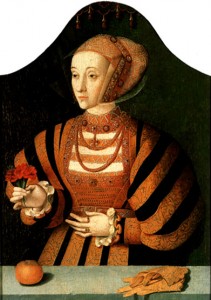 On Epiphany, Tuesday 6th January 1540, a reluctant Henry VIII married Anne of Cleves, or Anna von Jülich-Kleve-Berg, in the Queen’s Closet at Greenwich Palace.
On Epiphany, Tuesday 6th January 1540, a reluctant Henry VIII married Anne of Cleves, or Anna von Jülich-Kleve-Berg, in the Queen’s Closet at Greenwich Palace.
The bride was completely unaware of the fact that her groom had been trying his utmost to get out of the marriage, and that was why the wedding had been postponed from 4th January – Henry had been desperately searching for a way out. By the evening of 5th January, Henry realised that he had no other option but to go ahead with the proposed marriage. If he cancelled the wedding, it might “dryve her brother into the hands of the emperowre”, and he could not risk that.
The chronicler Edward Hall describes Anne on her wedding day:
“Then the Lordes went to fetche the Ladye Anne, whiche was apparelled in a gowne of ryche cloth of gold set full of large flowers of great & Orient Pearle, made after the Dutche fassion rownde, her here hangyng downe, whych was fayre, yelowe and long: On her head a Coronall of gold replenished with great stone, and set about full of braunches of Rosemary, about her necke and middle, luelles of great valew & estirnacion.”
The King was wearing “a gowne of ryche Tyssue [cloth of gold] lyned with Crymosyn”.
Hall records that Anne curtsied to the King three times and then the couple were married by Thomas Cranmer, the Archbishop of Canterbury. Anne’s wedding ring was engraved with the words “GOD SEND ME WEL TO KEPE”.
After the ceremony, the bride, groom and guests enjoyed the usual wine and spices, followed by “Bankettes, Maskes, and dyuerse dvsportes, tyll the tyme came that it pleased the Kyng and her to take their rest”. It was time for the all-important consummation of the marriage, something which seems to have been a complete disaster. The next morning, when Thomas Cromwell asked a rather bad-tempered Henry what he thought of his queen, Henry replied:
“Surely, as ye know, I liked her before not well, but now I like her much worse. For I have felt her belly and her breast, and thereby, as I can judge, she should be no maid… [The] which struck me so to the heart when I felt them that I had neither will nor courage to proceed any further in other matters… I have left her as good a maid as I found her.”
Henry discussed the matter with his physicians, telling them that “he found her body in such sort disordered and indisposed to excite and provoke any lust in him”. Henry was unable to consummate the marriage and blamed it on Anne’s appearances, for he “thought himself able to do the act with other, but not with her”.
It seems that Anne did not have any sexual knowledge at all, and Lady Rochford had to break it to her that it took more than just sleeping beside the King to be with child. Anne replied, saying, “when he comes to bed, he kisses me and taketh me by the hand and biddeth me, “Goodnight sweetheart”; and in the morning kisses me and biddeth me, “Farewell, darling”. Is that not enough?” The Countess of Rutland replied, “Madam, there must be more than this, or it will be long ere we have a Duke of York”, but Anne said that she was content with the status quo and did not know what more was needed.
Things never improved between the couple, and it wasn’t long before Henry’s head was turned by the young Catherine Howard, whom he married on 28th July 1540. Fortunately for Anne, she kept her head and walked out of the marriage with the title of the King’s Sister, property including Hever Castle, jewels, plate and an annual payment of £4000 per year.
(Taken from “On This Day in Tudor History” by Claire Ridgway)